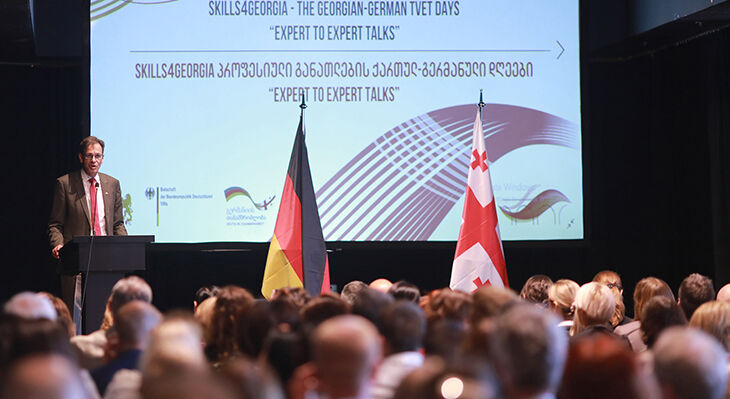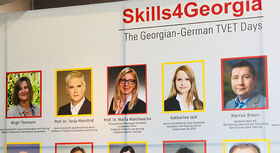Skills4Georgia brings together German and Georgian experts from academia and practice
Invited by the Georgian Ministry of Education and the German Embassy in Georgia, BIBB Head of Department Birgit Thomann formed part of an international expert group discussing global trends in vocational education and training and their applicability to Georgia.
With hundreds of visitors and participants from Georgia, Germany and other countries, including experts, entrepreneurs, business professionals, government officials, students and parents, the Georgian-German TVET Days took place in Tbilisi/Georgia on June 15 and 16 for the first time. Hosted by the Ministry of Education, Science, Culture and Sport of Georgia, the Federal Ministry for Economic Cooperation and Development and the Embassy of the Federal Republic of Germany in Georgia, the event celebrated the long-standing cooperation between Georgia and Germany in modernising Technical Vocational Education and Training (TVET). GIZ has pursued a comprehensive TVET cooperation with Georgia in a regional approach since 2013. The BIBB participated in conjunction with the German Federal Ministry of Education and Research (BMBF) that signed a Joint Declaration of Intent in 2016. Besides regular exchange activities, it gave technical support to the Amendment of the Georgian TVET Act through GOVET.
In addition to a full-day public event, an intensive exchange took place in workshops on expert level. In so-called “Expert-to-Expert talks” around 250 Georgian and German experts from academia and practice explored and discussed key aspects of the latest global trends in TVET and their relevance for the situation in Georgia. Birgit Thomann, head of the international department at the Federal Institute for Vocational Education and Training (BIBB), was invited to participate in two workshop sessions.
In the workshop on “Labour migration and internationalisation of technical vocational education and training”, Birgit Thomann and her colleagues from Germany and Georgia took a closer look at the recognition of international TVET qualifications, compliance with EU and other international TVET standards, as well as international and circular labour migration. Ms. Thomann reported on the procedure of recognizing foreign professional qualifications in Germany according to the Recognition Act. Special interest was shown in the information offered by the multilingual online portal “Recognition in Germany”. The portal provides those seeking recognition of their qualifications in Germany with information on the legal foundations and recognition procedures for individual occupations as well as counselling services at hand.
The second workshop session focused on “Engaging the private sector in the planning and implementation of technical vocational education and training”. Keeping in mind that the core aim of TVET is to provide for a workforce that is skilled and meets the requirements of companies and businesses across the country, the discussions centered around the involvement of chambers and business associations in planning and quality assurance of TVET. Ms. Thomann presented how different stakeholders jointly shape dual vocational education and training in Germany. Representatives of employer organizations, unions and federal and local government work together e.g. to issue recommendations for practice or statements on VET regulations.


